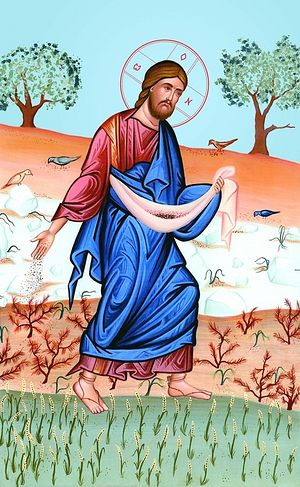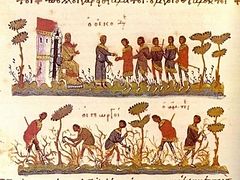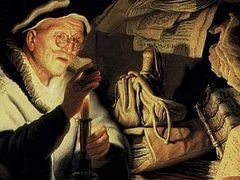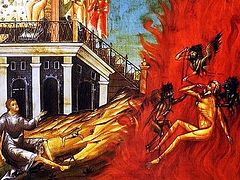Source: Notes on Arab Orthodoxy
October 16, 2015
Jesus told the following parable: A sower went out to sow his seed. And as he sowed, some fell by the wayside; and it was trampled down, and the birds of the air devoured it. Some fell on rock; and as soon as it sprang up, it withered away because it lacked moisture. And some fell among thorns, and the thorns sprang up with it and choked it. But others fell on good ground, sprang up, and yielded a crop a hundredfold. Then Jesus explains to His disciples what He meant by the parable and said, "The seed is the word of God" which brings forth fruit or dies according to the soil in which it is sown (cf. Luke 8:5-16).
God's word, then, may die if it does not find good soil that takes it in and embraces it, if it does not find a person who strives to be good soil in order to accept God's word and act according to it. God gave Himself as ransom for man and handed over to him the divine word, so that he may make it live if he acts according to it or make it die if he shies away from putting it into action.
How great is the generous God who gave His Word-- that is, Jesus Christ Himself, who is the "Word of God" according to the Gospel of John--to humankind. But humankind returns this divine generosity, this divine liberality, with miserliness and stinginess. In return for divine generosity, human miserliness. Jesus Himself, who is God according to the Christian faith, died on the cross for the sake of the world and this is the ultimate generosity, since there is no greater love than this. But man, whether Christian or non-Christian, has only returned this generosity with miserliness. He is stingy with himself, pleased to see people die by the thousands and the millions so that he may remain alive. What wretched miserliness!
Lately the icon of Saint George, the holy martyr who offered his life for his faith, refusing to offer sacrifices to Roman idols and to worship the emperor, has become popular. George, the Palestinian from Lydda, was an officer in the Roman army who willingly abandoned his weapons and gave himself over to his tormentors. He could have resisted and risen up against them and even killed some of them, but he faced them with the Word, his breast bare, and became a martyr whom the Church remembers from generation to generation, for eternity. By your Lord! Who is more courageous, George carrying a spear or George who met the spear with his breast bare? Christianity is clear in this matter. The courageous one is the one who stands firm in his principles and does not betray them in the time of adversity. O Saint George, if you could see-- and you do see!--what has become of those who pervert your message!
Christians kill God's word when they say that now is not the time to act according to God's word. As if the Word had appropriate and inappropriate times, according to the weather! The Word, as we said, is Jesus. So they put Him to death, they crucify Him for a second and third time... They drive Him out of the world when they neglect His word under various pretexts, the excuses of sin...
Christians are called to be like their Teacher, not to make their teacher in their own image. They must be good soil, soil clear of stones and thorns. This requires struggle to purify one's self from the cares of this suffocating world. No one will come to clear another person's soil. Everyone is responsible for cultivating his own soil, for reforming himself. If he does not smash the stones within himself and if he does not pluck out the thorns within himself, he will not bear fruit and he will not be of any good to anyone.




